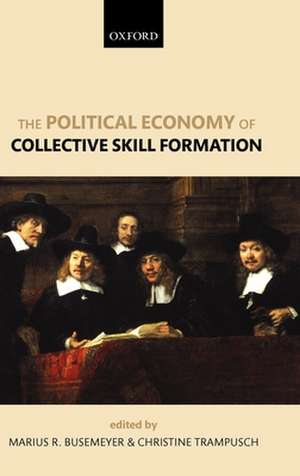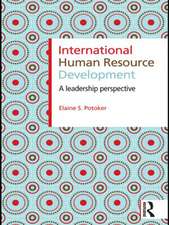The Political Economy of Collective Skill Formation
Editat de Marius R. Busemeyer, Christine Trampuschen Limba Engleză Hardback – 24 noi 2011
Preț: 807.24 lei
Preț vechi: 1094.23 lei
-26% Nou
Puncte Express: 1211
Preț estimativ în valută:
154.50€ • 160.67$ • 129.28£
154.50€ • 160.67$ • 129.28£
Carte tipărită la comandă
Livrare economică 03-10 martie
Preluare comenzi: 021 569.72.76
Specificații
ISBN-13: 9780199599431
ISBN-10: 0199599432
Pagini: 392
Ilustrații: 1
Dimensiuni: 162 x 240 x 27 mm
Greutate: 0.76 kg
Ediția:New.
Editura: Oxford University Press
Colecția OUP Oxford
Locul publicării:Oxford, United Kingdom
ISBN-10: 0199599432
Pagini: 392
Ilustrații: 1
Dimensiuni: 162 x 240 x 27 mm
Greutate: 0.76 kg
Ediția:New.
Editura: Oxford University Press
Colecția OUP Oxford
Locul publicării:Oxford, United Kingdom
Recenzii
This volume is the major publication in the vocational training literature since Thelen's seminal How Institutions Evolve. Studies of the main 'collective actor' systems - Germany, Switzerland, Austria, Denmark, and the Netherlands - bring the reader right up-to-date while also showing the historical evolution of the systems. In a most impressive introductory chapter, Busemeyer and Trampusch build an analytic political economic model to account for the different patterns of skill formation systems in the advanced world. And in sparkling country and comparative chapters (including by Iversen, Martin, Streeck, and Thelen) the book integrates a depth of empirical knowledge with sophisticated modern political economy. This book is a formidable achievement.
The contributions to this volume cover the waterfront on contemporary issues of skill formation and the politics to which it gives rise in the coordinated economies of Europe. They range from history to current challenges to debates on the concepts we use to understand skills and skill systems. Germany continues to cast a long shadow in these discussions, but this volume enriches the debate by widening it beyond the canonical German case. The editors have pulled together the contributors without losing sight of their divergent analytical contributions. A genuinely comparative volume likely to be of great use to both established scholars and new students of the political economy of skills.
In an era of revived political and societal interest for vocational education and similar systems of formation around the globe, the understanding of the history, the foundations, and the institutional subtleties and differences has become the key to understand the functions and dysfunctions of systems of collective skill formation. In this respect this book fills important gaps in the current knowledge and provides an excellent overview of the existing literature. Therefore I can only praise it as the indispensable source and base for more scholarly work on the political economy of collective skills formation in the future!
The contributions to this volume cover the waterfront on contemporary issues of skill formation and the politics to which it gives rise in the coordinated economies of Europe. They range from history to current challenges to debates on the concepts we use to understand skills and skill systems. Germany continues to cast a long shadow in these discussions, but this volume enriches the debate by widening it beyond the canonical German case. The editors have pulled together the contributors without losing sight of their divergent analytical contributions. A genuinely comparative volume likely to be of great use to both established scholars and new students of the political economy of skills.
In an era of revived political and societal interest for vocational education and similar systems of formation around the globe, the understanding of the history, the foundations, and the institutional subtleties and differences has become the key to understand the functions and dysfunctions of systems of collective skill formation. In this respect this book fills important gaps in the current knowledge and provides an excellent overview of the existing literature. Therefore I can only praise it as the indispensable source and base for more scholarly work on the political economy of collective skills formation in the future!
Notă biografică
Marius R. Busemeyer is a Professor of Political Science and head of an Emmy Noether research group at the University of Konstanz. Prior to this, he was a senior researcher at the Max Planck Institute for the Study of Societies in Cologne. His research focuses on the comparative political economy of education regimes and welfare states, public spending, individual social policy preferences, and theories of institutional change. Christine Trampusch is Professor of International Comparative Political Economy and Economic Sociology at the University of Cologne. Prior to this, she was Assistant Professor of Comparative Politics at the University of Berne. Her research centers on the study of the origins and changes of welfare states, industrial relations, and skill formation systems, in a historical and comparative perspective.











